Jennifer Lauck's Blog, page 30
February 9, 2011
Count Down to Publication: 18 Days
Last night I had a dream that I was in the hospital, pacing around, about to have a baby. I was a bit shocked to be pregnant but already adjusted my attitude, life and calendar to accommodate this new complexity. I told myself it was all fine. I'd just get a snuggle carrier and keep the baby close for the next two months, it wouldn't be that big of a deal, babies don't need to crawl around much for about eight weeks anyway, I told myself.
Isn't that just like a woman?
And aren't I giving birth?
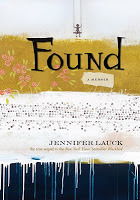 In eighteen days Found is officially out and frankly, it's already out because Amazon is shipping the darn thing around the US. I'm getting fan mails, via my site, with people telling me the news. "Amazon just shipped!!"
In eighteen days Found is officially out and frankly, it's already out because Amazon is shipping the darn thing around the US. I'm getting fan mails, via my site, with people telling me the news. "Amazon just shipped!!"In my own life, my schedule is being cleared for the next two months. My teaching partner is taking over the first six weeks of the term for me, my child care duties are being divide between the ex-husband, the current husband and my best friend, my writing responsibilities for the blog are being passed around to others who will keep the flame burning, my intern is being prepped for what she needs to do via Facebook and Twitter and I am setting up all manner of speaking engagements from now to next year. A contract is being drawn for a speaking agent in LA and we are talking about ways to get this book made into a movie--because it's that good.
At Seal Press, a pitch letter is being composed and my agent is desperate for copies of the book to send out to foreign presses and of course, this is the time that my son gets sick--vomiting and a rash around his eyes and mouth--and all my work must grind to a halt.
How do we do it? How do women with children make it all work and yet, a book coming out in the world is a child too. A baby is born in the release of a book and that's how this all feels. Urgent and crazy and painful and scary.
I console myself with this one mantra--this too shall pass--because I know it's true. All this will pass soon enough. The birth will be over and the growing of a book, over time and in the hearts and minds of people, will begin. A slow process. Blackbird is now ten years old. Still Waters is nine and Show Me the Way is seven years old. Here comes Found, the baby of the bunch. Will she be a brat or a golden child? Only time will tell and yes, yes, soon enough we will know.
February 8, 2011
Fresh Writing: If I Were in Charge of the World
If I were in charge of the world
I'd cancel oatmeal,
Monday mornings,
allergy shots, and also Sara Steinberg.
If I were in charge of the world
there'd be brighter nights lights,
healthier hamsters, and
basketball baskets forty eight inches lower.
If I were in charge of the world
you wouldn't have lonely,
you wouldn't have clean,
you wouldn't have bedtimes,
or "Don't punch your sister."
You wouldn't even have sisters.
If I were in charge of the world
a chocolate sundae with whipped cream and nuts
would be a vegetable,
all 007 movies would be G,
and a person who sometimes forgot to brush,
and sometimes forgot to flush,
would still be allowed to be
in charge of the world.
~ Judith Viorst
Here are a few of the kids versions
#1
If I were in charge of the world
everything would be powered by sunshine,
no money would be exchanged,
& I could stay up as long as I wanted.
If I were in charge of the world
I'd climb the biggest mountain, seven times in a row,
people would only trade for what they needed
& we could cut fewer trees.
If I were in charge of the world
I would save the rainforest but
people would still get what we needed
& people wouldn't need to power a car from gas,
we'd just use batteries.
If I were in charge of the world
we wouldn't need to make electricity,
there would be no violence
& parents would never hit a kid
who was in charge of the world.
If I were in charge of the world
I would make sure everyone was treated fairly,
people who wanted a job could have one
& everyone had enough food, water & people who loved them.
#2
If I were in charge of the world
I would make sure animals were treated fairly,
there was no war
& everyone was a vegetarian so no animals would die.
If I were in charge of the world
everyone would always eat Mac & Cheese,
& wear polka dots everyday.
If I were in charge of the world
I'd travel to different countries,
everyone would ride elephants & alligators
& I would run for president
where everyone would vote for me,
the person in charge of the world.
#3
If I were in charge of the world
I'd have a dad! That would be first.
If I were in charge of the world
I would be color blind,
I'd end world hunger for poor people
& for everyone.
If I were in charge of the world
I'd be a friend with everyone,
I'd help poor people
& I'd cook for everyone too.
If I were in charge of the world
I'd make everyone laugh,
I'd make world peace
& I'd make everyone recycle—that is
if I were in charge of the world.
Aren't they wonderful?
February 5, 2011
Announcements: Two New Classes
Spring Memoir Series
Let's face it, writing memoir is tough! All that emotion, all those experiences on the time line, all that wisdom we are dying to share with the world. How do we do it? How can we get it all organized and on the page to be beautiful, interesting, unique and even publishable? With four of these "bad boys" at my back, I have learned a trick or two about penning memoir. One trick is that writers need to find ways to get back to basics, have some fun and learn how to ENJOY this hard work of rendering the life-story.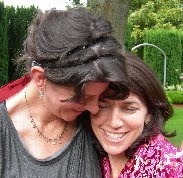 This spring, I've got a series of classes--in person and via conference call (for long distance students) that will put some lively joy into your process and your writing. For the first six weeks, I'm bringing in a guest teacher, Anne Gudger who has thirty years of writing and teaching experience. She is (as you can see, a very dear friend) and has been a student of my technique for three. Anne has created a "basics" approach to teaching my method that will give you insight and results. Anne is a terrific and compassionate teacher.
This spring, I've got a series of classes--in person and via conference call (for long distance students) that will put some lively joy into your process and your writing. For the first six weeks, I'm bringing in a guest teacher, Anne Gudger who has thirty years of writing and teaching experience. She is (as you can see, a very dear friend) and has been a student of my technique for three. Anne has created a "basics" approach to teaching my method that will give you insight and results. Anne is a terrific and compassionate teacher. In the second six weeks, I will jump in and teach my Master Class on memoir which will bring your work into the workshop format and help you fine tune your voice as well as your entire book length project.
DATES: Portland based class: Monday nights from March 21 to June 13, 5:30-8:30 p.m. Virtual Classes via conference call, same dates, 10:00-1:00 p.m. (NO CLASS ON MEMORIAL DAY)
COST: $800.00 Deposit for the first two classes required to hold your spot and students can then make payment arrangements with me.
REQUIREMENTS: Students need to have an interview with Jennifer, submit work, sign term of agreement and submit a deposit.
Write Your Book in a Year
Everyday, I meet people who are eager to write a memoir but don't know how to get the job done. So many writers start but then give up, overwhelmed. I have found this to be true even with writers who attend college level writing programs nationwide.
I have written and published four memoirs in ten years and have a formula to get the job done. My books have been on The New York Time Bestseller list and translated into many languages.

Write Your Memoir this Year is a nine-month intensive set on the Oregon Coast where I will bring eight memoir writers together to set goals, get foundational instruction, establish a regular writing schedule and receive ongoing support and write three full drafts of a completed memoir! With my technique, writers will learn how to get their first draft complete in two months time, their second in four months and then will be guided to use their months in the program to polish and focus their third draft. Throughout our time together, writers will be taught exactly what memoir is, how to establish "voice" which is the driver in memoir writing and how to craft effective scenes, summaries and reflections.
You can find some of this kind of direction in a three-year MFA program and you will pay between $25,000 and $40,000 with no guarantee of emerging with a final draft. In this program, as long as you do your part, you will get results you are looking for—a complete and publishable book.
SCHEDULE:
Aug 26, 27 & 28, 2011 2.5 days Kick Off Workshop
The kickoff workshop will get you on track with your goal, your schedule and your outline. You will also be given intensive instruction on writing a memoir and we will do some work-shopping together as well as writing prompts.
Sunday, Sept. 25 Full day teaching with dinner Sat. night
Sunday, Oct. 23 Full day teaching with dinner Sat. night
Sunday, Nov. 20 Full day teaching with dinner Sat. night
Sunday, Jan. 23 Full day teaching with dinner Sat. night
Sunday, Feb. 20 Full day teaching with dinner Sat. night
Sunday, Mar. 19 Full day teaching with dinner Sat. night
Each month, we will all meet in Manzanita for a full day of teaching, conversation, sharing and will share a meal together. Writers will send pages of what has been accomplished in their writing and these partial manuscripts will be read/discussed/edited during the full day teaching.
Apr. 30: Two Day Wrap Workshop
We will focus on final revisions/goal setting, marketing and pitching (if appropriate), meeting with literary agents and holding a public reading for the community of Manzanita.
Who Can Attend?
Eight students will be accepted. Acceptance is based on several conditions: interview and approval, signing of terms and conditions and down payment.
Tuition & Teaching Costs: $4500.00 – (includes some meals & snacks).
Lodging is separate and available at our location INN AT MANZANITA for the following rates: Off season Oct/May: $99.00-$129.00 per night. On season June/Sept: $179.00-199.00
Other wonderful accommodations at varying rates are also available and a list will be provided. Students are required to arrange their own transport and accommodations although we will help coordinate car-pooling options.
February 4, 2011
Book Talk: The Help by Kathryn Stockett

It is my delight and pleasure to feature the writing of Portland based author and teacher, Anne Gudger. Anne will be teaching a "prep" style basics class for me this spring, to help writers get past some of the growing pains that go with writing memoir. Anne is the a devoted mother of two grown children and is at work on a fine memoir. Enjoy her work here as she introduces a few of her favorite books!
I always have a book with me—in my bag, under my arm, in my car. That way if I'm meeting you for coffee and you're late, I read. If I have to wait for my kids, my doctor, my oil change guy, I read. My mom is the same way and she taught me at an early age to carry a book, especially when we lived out at Dash Point and frequently had to wait for a raised drawbridge to cross the Port of Tacoma to get to town. Red lights would flash as the crossing guard arms lowered. "Got your book?" Mom would ask. "Good."
 When The Help came out, my book group decided to read it. As a side bar, I'm not always crazy about the books our group collectively chose but I do love the women in my group, so I try to keep an open mind.
When The Help came out, my book group decided to read it. As a side bar, I'm not always crazy about the books our group collectively chose but I do love the women in my group, so I try to keep an open mind. The first few days after the group picked, that I carried The Help with me and no matter where I went, someone would stop and comment about much they loved the book.
I was intrigued.
A few days and ten of these comments later, I was far enough into The Help to agree: I loved it.
The Help is the story of three unforgettable women who defy the culture and tell true stories about the racial divide in Mississippi in 1962. Skeeter is a young white woman, a recent college graduate who wants more than an engagement ring and the promise of a new refrigerator even though that's what her family and friends want for her. She wants to be a journalist. She wants to write a powerful story. She convinces two black maids to tell their stories. After hand wringing and heartbreak—including the horrible beating death of a child--Aibileen and Minny write their stories about what it's really like to work for white families and the horrible truths of being black in the south in the 60's. It's a moving novel full of poignancy and humor and insights about being human.
Is the book wholly authentic? I don't know, but I'm not a reader who expects truth in fiction. As a reader and writer what I look for is the trap door, the slight of hand. I wonder how the lady squished herself up so tiny to fit in one half of the box so that it looks like the magician really cut her in two. And how'd they get the fake legs to look so real? I read to see how the author did it. I read for voice and structure and readability.
Stockett shines as a storyteller. She creates such distinctive voices for her characters that you don't even need the chapter reminders of who's talking unless you put the book down for too long and lose the thread—which you likely won't. Stockett weaves the three stories together seamlessly, as each character tells her own story and how her story overlaps with the other characters. Stockett's a writer who never drops her reader. I read this book when it came out almost two years ago and I still think about it when I think about voice.
Give it a try. Carry it with you. Maybe I'll see it under your arm or sticking out of your purse and I'll tell you that it's terrific!
February 2, 2011
Countdown to Publication: 28 Days
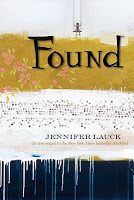 Monday morning, nine a.m., the ring of the bell comes and the then there is the stomp, stomp of boots across the front porch.
Monday morning, nine a.m., the ring of the bell comes and the then there is the stomp, stomp of boots across the front porch. I know before I open the door, before I squint against the morning sun that shines on bare branched trees, and before I wave at the UPS man for the delivery that this is it. Found is finally here!
I snap the envelope up from it's place under the front mat and rip the bubble package open.
There is no moment like this moment, when the first copy of a book arrives in the mail--in hard cover--it is as sweet as a first kiss. Truly. And I am lucky, I've have four of these "first time" arrivals. Blackbird, Still Waters, Show Me the Way and now Found.
Closing the door, I wander back into my quiet house. No one is here, just me. Walls, ceiling, windows and floor are witnesses. Spencer is gone to school, Jo too and it's just me. Isn't that the way it should be? Aren't some "firsts" best savored alone?
I ease to the edge of the sofa, the morning sun spilled over the rug and move my hand over the glossy cover. Found. Found. Found.
As I open the cover, that crack of the spine calls out "new book" and the smell of paper rises. Fresh clean paper. The pages are a surprising and unexpected shade of beige. I love, no truly adore the styling that has been applied to each chapter beginning which is a slice of art from the cover and looks like a bit of shredded paper. In the manuscript form, I thought I was going to hate the design for each chapter opening but now that it is here, in book form, I LOVE IT. What a joy to say so.
I read the first chapter, as if it is brand new and I don't know the words by heart....
I. When I Was Born I was given the perfect name, although it would take the better part of forty-six years to puzzle this perfection out...
There is something so fresh about the words on the page, almost dewy. I begin to doubt I was the person who labored over them and worked so very hard in order to make each one carry the exact weight needed to hold the entire story in balance. It's surreal. What once seemed so hard--the writing process that lasted nearly two years--seems like a long ago dream, as if the hard work never was.
If I could, if I had the time, I would curl up in the sun and read all day long. But look at the clock. I have a class to teach at ten a.m. and six would-be memoirists have pages of their own to talk about.
This moment, my slice of now, slides closed and it's time to get off the sofa and enter the day.
Before I leave the house, I design a little slip of paper that reads "1,000,000 copies sold" and then, with tiny bits of tape, afix the paper in place on the cover. Every accomplishment began with a goal and so, there mine is. May one million copies of this book sell in hardcover!
I tuck Found into my purse, like a secret. I know I will reach out to touch it, just to confirm that it is there, again and again throughout the day. I will pull it out for Spencer and he will do a little dance. I'll show it to my friend Anne and she'll grab it, demand her own copy and begin to read as if I am not there. And I'll even show my ex, Steve, and he'll get all sheepish and offer his own tip of the head that means "congratulations!"
The world is vast, we are all so busy in our lives and our own concerns and in the scheme of things--war, poverty, economic mayhem and all manner of human struggle--this book means nothing. But to me, it is a miracle. I have gone from an idea about a story I wanted to tell to published book--yet again.
January 31, 2011
Fresh Writing: Jo's World
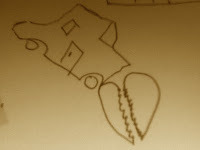 She has a new doodle book and shows me as we lay in bed-kissing away another day. The instruction on pg. 21 of the doodle book reads: If you could, what would you choose to erase from your world?
She has a new doodle book and shows me as we lay in bed-kissing away another day. The instruction on pg. 21 of the doodle book reads: If you could, what would you choose to erase from your world? She explains each drawing she's put on the page: "asparagus, spiders, axes (which cut down trees), cigarettes, McDonalds, cars and broken hearts."
As I marvel at this child of mine, just eight years old and full of her wonderous happiness, she continues to doodle new ideas as they come. She adds, "WAR, WEAPONS, knives and stinky socks." "Why do people need weapons, anyway?" she asks. "If you have a problem, you just resolve it!"
What more do I want than this child of mine? What better life than this?
January 28, 2011
Book Talk: Elizabeth McCracken & New Guest Writer Coming!
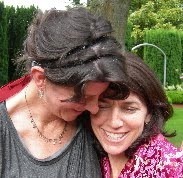 I am delighted to announce I have a guest writer, Anne Gudger, who is a student and a lovely writer in her own right. Anne is the one to watch, very soon, as she is writing a stunning memoir about the loss of her husband when she was expected their first child. She is a rising star.
I am delighted to announce I have a guest writer, Anne Gudger, who is a student and a lovely writer in her own right. Anne is the one to watch, very soon, as she is writing a stunning memoir about the loss of her husband when she was expected their first child. She is a rising star. Anne is also a writing teacher and a reader like no one I've ever met. Whenever I call her to chat, she's reading. Anne will begin Book Talk features next week, on books that have impacted her as a human being and a writer. More on Anne next week.
Until then, here is the conversation on Elizabeth McCracken's memoir with the longest title in history!
 This tidy memoir (just 184 pages) is the sad and intense story about McCracken's stillborn baby.
This tidy memoir (just 184 pages) is the sad and intense story about McCracken's stillborn baby. I want to explore McCracken's choice to tell the reader about the death of the baby right up front and then to repeat this over and over again. Here are the opening lines of the first four chapters (although they are never numbered or titled, so I don't know if they are chapters but rather are more like breaks).
1. Once upon a time, before I knew anything about the subject, a woman told me that I should write a book about the lighter side of losing a child (this is not that book). (3)
2. A child dies in this book: a baby. A baby is stillborn. You don't have to tell me how sad that is: it happened to me and my husband, our baby, a son. (6)
3. I will always be a woman whose first child died… (13)
4. This is the happiest story in the world with the saddest ending. (16)
McCracken also tells us that she is writing the book while holding her healthy second child—so all turns out relatively well in the end. But what purpose does her approach of complete revelation serve and why does she approach telling her story in this manner?
Perhaps McCracken tells us the baby dies in order to get the hard part of the story out. She lets the reader into the deep, primal shock and asks her to sit, for a bit, in the cultures odd way of considering such a loss. On one side, we all can agree that one of the most difficult losses a human can endure is the loss of a child. A child's death seems unfair and premature. And yet, when it comes to the death of an infant, there is a special category of confusion. To many, a new baby hasn't taken on enough features and personality to be counted fully as a "child." Those who have gone through miscarriage and the death of an infant are often told things like: "it wasn't meant to be or it was best due to some flaw in the biology." Babies often don't count and so a mother who has a deep connection to her unborn child is left in a kind of horrible limbo of confusion about how to feel, while also facing real grief.
I recall my own pregnancies, my intense feelings of love and protectiveness for my unborn children and the surreal primal fear that I lived with when I imagined something might go wrong before the baby entered the world. There was no basis for this fear—the premature death of babies wasn't part of any known lineage—I was scared in proportion to my deep connection to my child. During the final trimester, when my water broke six weeks early, the first thing I did was poke at my stomach to get the baby inside moving. Alone in the middle of the night, worried sick that my baby was dead inside me, I shoved him hard and said, "MOVE" in a way that wasn't very gentle or kind. Blessedly, I was rewarded with movement. My child was okay.
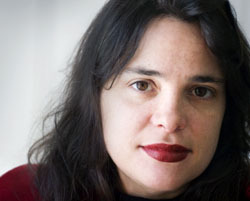 But here is McCracken, living my worst nightmare and also cutting right to the fact that a lot of people—a lot very ignorant people—dismiss her. She speaks to what happened directly and repeatedly in order to dig into the void of stunned, frozen cultural silence and chink away at it in order that we can inhabit the glacier sized sorrow that is her experience (as well as the experience of so many others).
But here is McCracken, living my worst nightmare and also cutting right to the fact that a lot of people—a lot very ignorant people—dismiss her. She speaks to what happened directly and repeatedly in order to dig into the void of stunned, frozen cultural silence and chink away at it in order that we can inhabit the glacier sized sorrow that is her experience (as well as the experience of so many others). She writes: No matter how I vowed to hold on to the happiness of the pregnancy, it was impossible, such a solitary pastime. When your child dies you cannot talk about how much you loved being pregnant. (20)
And: That is one of the strangest side effects of the whole story. I am that thing worse than a cautionary tale: I am a horror story, an example of something terrible going wrong when you least expect it, and for no good reason, a story to be kept from pregnant women, a story so grim and lessonless it's better not to think about it at all. (43)
Another answer to the question, "why does she tell us what happened up front?" might also be found in McCracken's background as a writer. She is a novelist first—trained in that form. As the great novelist Kurt Vonnegut taught: tell the reader everything up front.
I'm not well read enough in the form of a novel to know if this counsel is standard for fiction but the "tell everything up front" teaching is clearly what she is doing and her training likely brings some bearing on her choices.
For my own work, as a memoir writer, I prefer the "surprise" technique or the technique of telling the reader what is going on but allowing the story to unfold as a revelation of sorts. I like to sprinkle hints—so the reader is in the know—but to take some twists and turns in the body of the work in order to amaze the reader, catch her off guard and even up the ante of the forward moving action.
And I can also fully appreciate what McCracken has done in her own work. I found the directness of her approach gave time to let the shock of such a loss sink deeply into my mother bones (as it had in her own). I was able to read her memoir in a more open and receptive way. Sometimes it's a very good idea not to keep your reader guessing.
January 26, 2011
Countdown to Publication: 34 Days
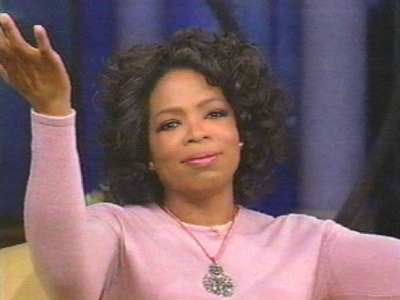 Oprah Winfrey's mother had a child and put her up for adoption when Oprah was nine. The news is out, the show is run, and in response—adopted people, birth mothers and countless fans toss emails around the internet and scramble to their computers to watch the show that "tells all" about this star-studded reveal.
Oprah Winfrey's mother had a child and put her up for adoption when Oprah was nine. The news is out, the show is run, and in response—adopted people, birth mothers and countless fans toss emails around the internet and scramble to their computers to watch the show that "tells all" about this star-studded reveal. In thirty-four days Found: The True Sequel to Blackbird will come out. Thank you to Seal Press. This book is the story of my own search and finding of my birth mother, and with the Oprah reveal of this week, is likely well timed. In fact, friends are writing about how lucky I am that Oprah is releasing this story at this time. It's free publicity. Go. Go. Go.
Free publicity? Perhaps. Good timing? I don't know. What's intriguing to me is how, as artists in a world where the buck funds our process and our creative ventures (at least we hope), we have been tuned to want a coveted slot on Oprah Winfrey's program. But what are we willing to do to get that nod and what do we think of ourselves if we don't? ling to do to get that nod? Will we sacrifice our honor? Will be compromise our truth? Will we skim off a layer of integrity?
These are truly haunting questions, are they not? And they are questions that go beyond the writer's life and into life itself, as well as the decisions we make as women, artists and even mothers.
Ten years ago, I was on Oprah, which was a blessing—yes—but also very different than you might imagine. During my interview prior to the show, I was fed my lines, which was so compromising to my former journalistic self that I broke down in tears.
In preparation for the actual show, Oprah's stylist told me that I could not put my hair up, which was how I felt most comfortable. "If you want it up, cut it off!!!" she yelled. She whipped out a flat iron and my hair was pressed instead (and broke off later—burnt to a crisp).
And then I met Oprah who was late to the taping due to the fact that she was reading Blackbird at that very moment. When she finally appeared, she bellowed, "Why isn't this a Book of the Month book?" In response, a flurry of producers rushed around, insued mass commotion, and insisted this show—one on abandoned children—was the show we had to do.
Some would say, "don't complain, Jennifer, you were given a gift." And I don't disagree. I scurried back to my life, snipped off the seared hair and continued on my quest for answers. I was grateful to Oprah while also deeply disturbed by my own willingness to be shoved around.
While Oprah continued along her journey, racking up millions of dollars and becoming even mightier than before, I became as poor as a pauper, retreated into Buddhism and racked up millions of prayers in the Rocky Mountains, for the benefit of all beings.
While Oprah interviewed all manner of celebrity and became the brightest star, I spoke only to the inner guides of my soul—a few very skilled therapists—and was shown the way home to my orginal family and ancestors.
Low these ten years later, I return with answers, a new-found identity and a beautiful story of how it all happened. And as Found is about to be released, here is Oprah with her stunning revelation of a half sister (named Patricia) abandoned in 1963.
As a seeker of healing and of truth, I am happy Oprah is now "in" the story of adoption. What concerns me is the same issue that concerned me, long ago. Will the story of adoption and it's many heartaches be "shoved" around? Or will it be given the attention, wisdom and depth that the subject so needs at this time?
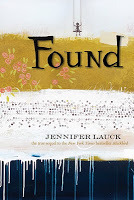 In researching and writing Found, about my own adoption, I have learned first hand about this least spoken of and yet the most mind-boggling sorrow of these last one hundred years. Women, countless millions, due to economic, social and family pressures, were (and continue to be) forced to make impossible soul-shredding decisions to part with their children.
In researching and writing Found, about my own adoption, I have learned first hand about this least spoken of and yet the most mind-boggling sorrow of these last one hundred years. Women, countless millions, due to economic, social and family pressures, were (and continue to be) forced to make impossible soul-shredding decisions to part with their children. Like William Styron showed us in his stunning novel Sophie's Choice, when that woman was forced at gun point—by a Nazi—to chose between one of her children or both would be killed, the outcome was beyond grim. Both children died and Sophie was haunted until taking her own life. Styron portrayed this global epic tragedy—where cultures force woman make these kinds of choices daily—perfectly.
Think of our poor sisters in China, Vietnam, Korea, Russia, Africa, here in the U.S., and countless other countries, imagine their children, and see how we, as a race of supposed higher beings, chose not to take action. We look the other way, we speak in generalities and platitudes and in some cases we pluck the babies from the arms of another and say "ho hum" she is too poor, too ignorant, too too too, in order to get what we want—a solution to infertility.
Let me state, emphatically, that there are children who need to be adopted and there are good, no remarkable and enlightened adoptive parents out there who place the needs (and sorrows) of their adopted children first. This is true. And there are others who don't give a nit for the fate of the original mother who bore their child or the deep sorrows contained in the child herself. In far too many cases the original mother has been forgotten, psychically annihilated and in some cases legally obliterated. The child is assimilated, adapted and called "lucky" for her new family and worse is often denied access to ancestry.
It is time to talk, with heartfelt candor, about adoption. So bravo Oprah. Bravo. But this is not a time of two-minute video snippets cushioned between commercials for movies and laundry detergent. It is a time for deep and lasting healing that honors the birth mother and the adoptee and speaks with true knowing about both. With more than seven million adoptees in this country, healing is necessary. Truth is vital.
I make this earnest effort in my own writing and teaching. I work to be true to the truth and truth be told, my life is not measured by appearances on talk shows. I am a writer and I have this medium of the word, which is far more lasting and resilient than the flash of the video frame. I am glad to be Jennifer Lauck, home from my quest and I am most eager for the release of this good and important book Found.
As a writer, artist, truth teller, how much would you do to get on Oprah? And how much more valid do you believe your work would be with that kind of public recognition?
January 24, 2011
Fresh Writing: The Newsroom
On the day I got fired, I left my boyfriend—Steve, at my place with my dog named Carmel—the two of them together in my apartment to enjoy a lazy Saturday while I went to work because that's what I did. I worked on the weekends and I worked the late night shift and I worked the holidays too. All of them. I loved to work. I lived for work. If anyone asked, I'd say I was my work.
"Have a great day," Steve said, his feet up on my sofa. I knew, as I pulled the door closed that he would spend the greater hunk of the day right there, reading the paper and eating the food in my refrigerator. Maybe later he'd take a shower in my bathroom and forget to hang up the towel and when I said something about the wadded wet towel on the white tile floor later, his response would be, "man, are you uptight."
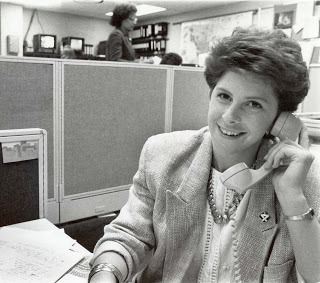 On the day I got fired, I wore a form fitting Calvin Klein suit—black and white checks in the pattern of the fabric. A forest green linen shirt gave a splash of color to the ensemble and my shoes were sensible black pumps. All snazzy and sharp, I also stopped at the 7-11 to get Ava a cup of her favorite coffee and two donuts with sprinkles on top. I made sure to get the creamers on the side too but these details wouldn't matter to Ava, being nice wouldn't matter either. Ava, her afro poking up this way and that, a tilt of crazy hair that wobbled around her head like it was supercharged with some kind of electricity, would be elbow deep in the morning paper, police scanners blaring behind her and three TV's on too. She'd be pissed, like she was always pissed and ready to tell me to get to work because that's what an assignment editor did. She barked at reporters and reporters got to work.
On the day I got fired, I wore a form fitting Calvin Klein suit—black and white checks in the pattern of the fabric. A forest green linen shirt gave a splash of color to the ensemble and my shoes were sensible black pumps. All snazzy and sharp, I also stopped at the 7-11 to get Ava a cup of her favorite coffee and two donuts with sprinkles on top. I made sure to get the creamers on the side too but these details wouldn't matter to Ava, being nice wouldn't matter either. Ava, her afro poking up this way and that, a tilt of crazy hair that wobbled around her head like it was supercharged with some kind of electricity, would be elbow deep in the morning paper, police scanners blaring behind her and three TV's on too. She'd be pissed, like she was always pissed and ready to tell me to get to work because that's what an assignment editor did. She barked at reporters and reporters got to work. And that's how it went down, that day, my last day in T.V. news working as an investigative reporter at the age of twenty-three. KXLY-TV. Spokane, Washington, a tired little town on the eastern edge of the state which was fast drive to and through the panhandle of Idaho and two hours from the Montana state line.
"You're late," Ava pointed out when I walked into the newsroom.
I set her coffee and donuts on her desk.
"Your welcome," I said.
Ava nodded at the coffee gift and went back to her newspaper—silent.
As if I didn't sting from her bitter tone, I dropped my purse on the back of my chair, put my own coffee by the typewriter, an IMB Electric Selectric with an automatic back up correction key and checked my mail slot—the one marked LAUCK.
Tilted on its manila side was a letter that read "Society of Professional Journalists."
"Look at that!" I said.
I slid my thumb under the flap, a little shaky for how I knew it was good news or bad. You win. You lose. The Society of Professional Journalists gave out annual awards but before I could fish out the envelope and study the results, Ava shook a pile of pink message slips in my direction.
"Hello?" she said, "remember your story? From last night? Wake up, it's time to get to work!"
I wanted to ignore her but something bigger won out. Guilt? Very likely guilt and the accusation in Ava's tone of voice that said, " you're blowing it, Lauck. You are not acting like a real reporter. You're not doing your job."
Of course she didn't say those words. She didn't need to. They were spoken in every exasperated eye roll, every smart assed comment and every shake of the head. Ava didn't think I should work at KXLY, didn't deserve to be promoted there from the tiny little outback where I worked before in Montana and she didn't think I had the "chops" to survive in the business. Which was funny, in retrospect. Spokane was not New York or even L.A. Spokane was small potatoes, a snag along the river bank to much bigger destinations—a whirlpool where I was temporarily turning in circles and going around and around and around to no-where-fast.
On the day I got fired, I forgot the notification from the Society of Professional Journalists and flipped, instead, through the message slips, which were "call in tips" from viewers. People who were claiming, according to the messages, to have seen a kid who we reported about last night as a possible abduction.
I already knew about the tips, Ava had called me at home last night to tell me but we both agreed, at least at midnight, that the tips were common at the beginning of a missing person's story and that it would be best not to chase every crazy lead. We agreed to wait until daylight, check in at the sight of the search, interview the cop in charge and then talk about what story I would file—as an update—about the missing kid.
What I hoped, deep in my gut, was that the kid would be found—safe and sound—over the long night and that we would be able to report that all was well in his world. I wanted a good outcome for a scary story. No one wanted to have a seventeen-year-old kid, who had gone missing, to end up being a victim of foul play. That was, to me, a bad story. It was sad and cruel and even painful—especially for the mother and the family and for everyone. How did anyone gain from the death of a kid?
Except in the real world, in small-town-Spokane, hearts were small and reporters who worked in that town salivated for a good murder story. Who cared about the age of the victim? The goal was to beat the competition—break an exclusive—and get the best video. The goal was viewers. Cash in on fear. Make people cry in front of their televisions. Get them hooked on your channel long enough to see the commercials we ran selling furniture and light bulbs and dishwashing detergent.
The story about this kid went like this. Ateenage boy from a local high school, an honors student from a good family, disappeared from Riverside State Park at about noon. His car, a black Chevy Nova was found in the parking lot. His wallet, empty, was found a few feet away. The keys to the car were gone. There was no sign of the kid or a struggle. Police had no leads. The mother, interviewed by every reporter in town, asked anyone and everyone to please, please, please look out for her child. The photo of the boy, released by the mother, showed a good-looking youth with dark hair and eyes, slim, narrow face, slight build. His feet, according the mother were size twelve (he was apparently in a growth spurt) and he was wearing jeans, a black t-shirt and a navy blue windbreaker. He might be wearing a red baseball cap. The mother wasn't one hundred percent sure. She didn't see him the morning he left for school, she had gone to work before he was awake. Instead, fellow students, who had seen the kid earlier on the day he disappeared, described his outfit.
"These messages say he's been spotted along the interstate."
"Brilliant, Lauck."
"Near the Sprague exit too," I added. "Okay, so what do we do with that? Should we go to the highway, get some video, interview a few of these people?"
"That's a start," Ava said. "Look, this is your job. Figure it out. Get a story though. You've got…" Ava eyed the clock set to Pacific Time, "…eight hours. Go!"
With my courtesy coffee in her hand, Ava flicked at me like I was a bug that needed to go away and I took up my purse, left my coffee behind and walked out of the newsroom in search of my cameraman—Allen.
~
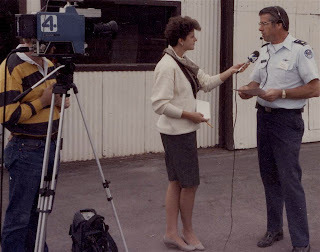 Allen and me had clocked a lot of hours together in the front seat of the news rig. Press conferences, fires, traffic accidents. Allen was the guy I worked with most weekends and no matter where we went, he always drove. While he was driving, Allen kept his eyes on the road and made sure to stay safe—driving with both hands on the wheel. From the passenger seat, I had a close up view of his right ear canal. For most people an ear isn't memorable but Allen had more crap in his ear. Was it wax? Lint? Dandruff? How many hours did I sit, on the road with Allen and perplex myself over the puzzle of his ear contents. I would try so hard not to look only to find my eyes drawn in. How I wanted to tell him, no beg him, to go to the store and purchase swabs.
Allen and me had clocked a lot of hours together in the front seat of the news rig. Press conferences, fires, traffic accidents. Allen was the guy I worked with most weekends and no matter where we went, he always drove. While he was driving, Allen kept his eyes on the road and made sure to stay safe—driving with both hands on the wheel. From the passenger seat, I had a close up view of his right ear canal. For most people an ear isn't memorable but Allen had more crap in his ear. Was it wax? Lint? Dandruff? How many hours did I sit, on the road with Allen and perplex myself over the puzzle of his ear contents. I would try so hard not to look only to find my eyes drawn in. How I wanted to tell him, no beg him, to go to the store and purchase swabs. But I didn't.
I just averted my eyes and made small talk and forced myself to stop staring at Allen's ear crud.
Allen wasn't a bad guy. He was a little heavy around the middle and soft in the shoulders and he did wear striped rugby shirts that seemed to draw the eye to his swollen belly, but over all, a nice guy. Bland. Vanilla. Allen wasn't exciting or daring or even dangerous. He was just like his name. Allen. Like the wrench—Allen was a bit of a tool. Reliable and then, when we were done working our shift together, forgettable.
My favorite cameraman was Lyle, blue eyes like ice and curly black hair (with a hint of gray) that I wanted to touch just to see how soft it was. Lyle was exciting and sexy and hot beyond description but he was another silence I kept to myself. Besides, Lyle didn't work weekends. He was too fantastic for holidays too. Lyle was one of the people Ava adored (with good reason), he had an amazing eye behind the camera and good artistic instincts. Although Lyle was known as the "complainer," he was so good-looking, that part of his personality was set aside.
On the day I got fired, I worked with Allen all day long. We drove to the scene where the kid disappeared, interviewed the cops and the guy who had the search and rescue dogs. I wrote down a statistic in my book, the cost of the search, which was passed directly to tax payers. It was costing like five thousand dollars a day to search for the missing kid. Why this was important, I didn't know but Ava would be happy. She loved obscure and irrelevant factoids.
By noon, Allen and I were in the parking lot of Zip's getting a burger and fries. Allen ate two Belly Busters—the ones with ham on top—and had a milkshake to wash it all down.
Ava and I talked on the phone and that's when we agreed I would follow the call in tips and drive up the interstate. I told her, "why not, we've got all day. Allen and I will just drive around a little bit and see what we can find."
From her end of the conversation, Ava said that she had been monitoring the other stations and they were all doing the standard follow up story. Nothing new was coming in. She gave Allen and me the okay to sniff around.
As I look back now, at that decision, I have it in my memory that I was the one who had the idea to check out the random leads, that I had an intuition in my gut that kid wasn't missing or even dead but instead was up to something. Perhaps a prank or maybe was even a runaway.
I want to believe I was the one who thought this scenario up but if Ava or even Allen were telling this story it would be different. Ava would be the one who knew and forced me to go check it out, she'd likely say that I didn't want to, being a lackluster weekend reporter from Montana who had no journalistic instincts and didn't even deserve the job. Allen would likely say it had been his idea, wanting to go out and search for the kid on our own. But that's not how I remember it. I just remember thinking, "that kid isn't missing. He walked away. He's running."
And here's why. The boy in question was the son of a local activist. I cannot remember, if my life depended on it, what she was for or against. I want to say she was pro-life and that she was high profile meaning she carried signs of dismembered fetuses in her car and picketed on corners and in front of Planned Parenthood clinics and yelled at anyone within twenty feet: "SAVE THE BABIES. GIVE THEM TO ME!!! ABORTION IS MURDER!!!!"
Yes, the mother of that boy was prime time loud and with a mother like that, who wouldn't run away?
So off we went, Allen and me, bellies full of burgers and fries, his ears full of gunk and my mind full of comments I wouldn't dare say out loud.
On the day I got fired, Allen and I ended up in a little farm town called Sprague with it's wide open spaces and fields laid bare in swatches of green and brown for rotation farming. The crop out in Sprague was wheat and the fields lifted in gentle hills that unrolled to the east as far as a person could imagine. It was the beginning of Palouse country, which, if you saw it from a birds view, looked like virgin sand dunes blown the wind.
Why we ended up in a little corner store in Sprague, I don't know. Was Allen thirsty for a Coke? Did I want to call Ava on a landline? I just know we were in that little store and I ended up talking to the man behind the counter. Another man was in the store too, getting three inch nails.
"You guys hear about a kid who's missing in Spokane?" I asked. "Name of Tim?"
"Yep," said the guy who sat behind the counter. He had a chaw of tobacco in his lip and yellow stained spit along both sides of his mouth. The man, somewhere in his sixties, gray stubble on a double chin and white hair poking from under a striped baseball cap, was balanced on the edge of a metal stool and wore zip up coveralls in a shade that once had been beige but had, due to time and neglect, become grayish black. He pulled an empty can from under the counter and let go of a long stream of yellow spit.
"Well," I said, "we've got some tips that a kid was spotted out here, last night. Hear anything about that?"
The man wiped the back of his arm over his mouth and shook his head like nope, he ain't heard nothing about that.
I chewed my lip, double thinking my reason for being in the store when the other man came up the aisle with the box of nails. He thumbed at the window in the general direction of the northeast.
"Old Seth's got a new kid out at his place, washing trucks today," he said.
"Hmm," said the man behind the counter, taking up the nails and looking for a price tag. "You don't say."
My heart skipped a full beat and due to a lack of breathing, I felt light headed.
I looked through the dirty window of that store, in search of Allen who was out getting gas but I only saw a swatch of his yellow and blue striped rugby shirt on the other side of the truck.
"Seth?" I said. "Can you tell me where his place is? I sure would like to check that out and see if it's the same kid."
There was no response for the longest minute of my life as the men took me in from the top of my short, stylish haircut to the bottom on my practical black pumps. Just what did they made of this woman in a hounds tooth suit anyway? Where they thinking, "city girl?"
The fan in the store, high on the ceiling, was the only sound in that place and made a thawp, thwap, thwap that went right up the back of my neck.
The man buying the nails wasn't that tall but he was thick and solid. A farmer. His hat was tipped back on his head, John Deere written across the brim and his face was clean shaved. He had dark blue eyes, like still water.
In a few minutes, that farmer gave me the directions to Seth's place, five hundred acres of prime farmland just east of town. A right turn there and a left turn here and next thing, Allen and I pulled up to a huge metal building where several semi truck's were shining—as if just washed—in the afternoon sun.
I just knew, in my gut, the boy was there. I could feel it like energy pulse. It was hot and wavy and my heart pounded in my chest so hard it hurt.
I didn't call Ava though. Not yet. I wanted to be sure.
I told Allen to hold back on shooting any video. "Let's be polite," I said. "I don't want to scare these people with cameras. Let's take it slow."
We both agreed, before I left the truck, that he would not tell Ava where we were either, because if he did, especially on the two-way, the other stations would here and the story wouldn't be ours anymore.
A knock on the door of the farmhouse and a woman answered right away. She wore a cotton dress, baby blue and over that was a white apron. She looked like she was fifth generation farm girl with her hair up on top of her head, a whole gaggle of little ones clustered around her legs and flour on her face. She had been baking a pie.
"Are you here about Jack?" she asked.
"Jack?" I said.
"He's been helping out today, doing chores for some extra money."
"Oh," I said, "well, actually, yes. Is he here?"
The woman looked at me and I looked at her and she had soft mother eyes that knew about boys who ran away from home and were looking for another way. I wasn't a mother yet, that would be a long ways off, but I had been a wanderer for all of my life and knew a few things too. My parents died when I was small, my brother had shot himself just a couple years back and I had been passed around, as a child, from family to family and when it suited some, from man to man.
That's why I worked all the time, why I tried so hard to be liked and why I would never succeed playing this heartless news game or even become a great reporter who cared most about leading the news with a story of disaster and pain.
The woman looked up as if he might be over her head and then she bit her lip and nodded. She leaned forward and whispered. "He's hiding upstairs."
"Can I talk to him," I asked, "just talk. That's all."
The farmwife nodded and made her kids move off to the side in order to open the screen door. As we went up the stairs, I told the woman I was a reporter from Spokane but that I wouldn't put any of this on the news. I told her all I wanted to do was make sure the kid was okay and was the same kid everyone was searching for and if he was, I'd call his mother and get him home safe.
The woman nodded while I talked and seemed to take it all in stride. At a door at the end of the hall, she knocked a couple times and then turned the knob to let me in. Her kids were down the steps, all their little faces looking up and I went into the room by myself.
As if the photo of Tim grew to be full sized, there he stood—the missing youth—the good looking boy with dark hair and eyes who was slim with a narrow face and a slight build. His feet were big and of course, could have passed for a size twelve and he was wearing jeans, a black t-shirt and a navy blue windbreaker. There was no baseball cap.
Tim hung his head, as if busted, the way you see teenagers do sometimes. His hide out was a room with two bunk beds and a dresser shoved to the side.
I did not know Tim, we were not friends and I did not know his family and yet something in me snapped and I stopped imagining that we were separate in any way. Being a stranger didn't matter. He was a human being and he was alive! I reached out to this kid, pulled him into my arms and hugged him like a mother would do. I hugged that boy so tight and no, he didn't hug me back but he did laugh like he had been taken by surprise and I laughed for how out of character it was for me to show that much emotion. I set Tim back from me and looked him level. "I'm so glad you're okay," I said. "Everyone is so worried about you."
Tim was like a rag in my hands, so frail and worn out from running to wherever he was going. He also looked spooked by his adventure and the decision he had made. After the initial exaltation of finding him, we sat together on the bottom bunk of one of those beds and I told him who I was and where I worked and then I asked what was going on. Why had he left?
Like I suspected, Tim ran away. His mother had been on his case, things were crappy with his dad, school was a bummer and the pressure to go to college was just too much. He wanted to be free. He wanted a different life. He wanted something but didn't know what.
He talked and cried and then talked a little more.
I yanked a napkin from Zip's out of my pocket and handed it over to him.
Tim swiped at his face and blew his nose. He was so young.
"What do you want to do?" I asked. "Do you want to keep running? Do you want to go home? Tell me. Just tell me what you want."
At that moment, I was as good as fired. I had entered the worst terrain a reporter could enter. Without even realizing what I had done, I had left the land known as "impartial" and walked down the path of heart. There was no turning back. Yet I had no map.
Tim asked me to go ahead and call his mom. He was sorry he had upset everyone. He just wanted to go home.
Tim asked if I would leave too. No video. No interview. Just let him and mom work things out on their own.
"
Could you do that?" he asked.
On the day I got fired, I said yes, I would do that. And I left.
Back at the station, Ava had called in the news director to tell him how I had blown it on every possible channel. I had missed the big story that every other station had run, except for us. I didn't even get an interview and we were smeared by the completion—creamed on a story we owned until I walked away.
Steve Johnson, the big boss, was waiting for me when we got back. He did a finger motion that said, "get into my office, right now."
On the day I got fired, I cleaned out my desk, dumped everything into a cardboard box and carried it out to my car. I loaded my stuff into the passenger seat of my Honda Civic and came around to the driver's side. Ava didn't say goodbye. Niether did Allen. I was old news, history.
Somehow Johnson had gotten someone from payroll in to cut me a final check so that would be it. No more contact.
As I sat in the parking lot, hands on the wheel, I felt as low as I had ever felt. I was a failure. Total and complete but the thing was, no one I knew would care. All my people were.
About to cry over my pathetic state, I remembered that envelope that came from The Society of Professional Journalists. Leaned over the cardboard box, I shuffled through the papers and reporter note pads until I found it, flap open, the mystery letter tucked inside.
I fished out a white page, just one and read how I had won five awards. One of the stories had been about an abduction, last year, of a woman who had never been found. I had hated that story for it's futile and sad end and yet, look, I had won a prize.
Hot tears burned down my face and splashed on my dark green linen top. Who cared? I didn't. I just sat there, a kid myself and I cried only there was no benevolent person to hand me a napkin or help me get home. I was on my own that day. I had to figure out what came next.
On the day I got fired, I started up my car and drove home to find my dog and my man where I had left them. On the sofa. There was, indeed, a wet towel on the bathroom floor. But this time, I didn't say anything.
January 23, 2011
Announcements: Spring Tour & Teaching
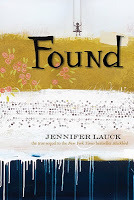 Many wonderful and exciting things are happening. Among them are the events for the release of Found which will be March 1, 2011. That's little more than a month away.
Many wonderful and exciting things are happening. Among them are the events for the release of Found which will be March 1, 2011. That's little more than a month away. A page will be placed here on the site for events that are coming up. Keep your eyes out and here is what is coming up as of now:
EVENTS:
Adoption Mosaic-Reunion Panel and Reading - Saturday, March 5th from 10-2 ( I'd love to get Broadway books to come sell for them)
Powell's Bookstore, Portland, OR - Monday, March 7th, 7:30pm
Elliot Bay Bookstore, Seattle, WA –Wednesday, March 9th at 7pm
Book Passage, Corte Madera, CA –Sunday, March 13th at 7pm
Books Inc, Berkeley, CA – Monday, March 14th, at 7pm
American Adoption Congress - Teaching - April 13/19 - Orlando, FL (available for events in area)
Hoffman Center - Workshop & reading - Saturday June 19, 10-3 & 7 pm Manzanita, OR
Sitka Center - Workshop - July 25-26, - Lincoln City, Oregon
TEACHINGS:
Writing Life: How to Write a Memoir-Audio: A downloadable audio teaching is coming March 1st. The cost is $39.95 for five hours of insightful, uplifting and mind boggling teaching on how to craft a memoir, beginning to end.
Write Your Book in a Year: In Aug. 2011, a nine month program held in Manzanita, Oregon, will take six writers all the way through their memoir projects, from beginning to end. Look for the formal announcement of this exciting program next week.
Master Class Writing Teaching: These classes, in Portland and via a virtual format are coming this spring for upper level writers crafting their novels and memoirs.
Back to Basics Writing: This amazing class, also beginning this spring, will help writers get some of the basic tools of memoir writing in the toolbox.
For more information on all these classes, CONTACT ME via this site and I'll get you more details.



